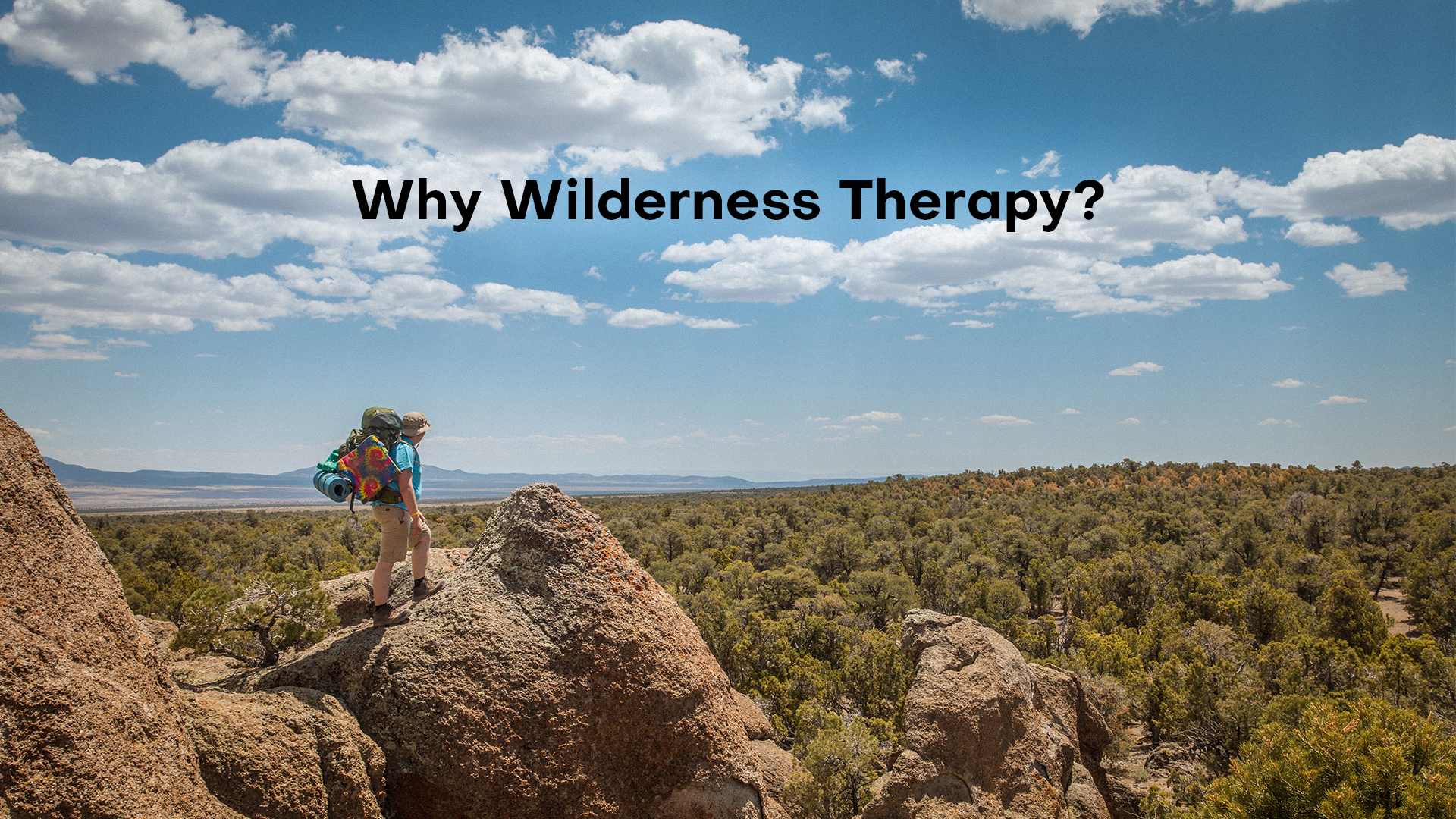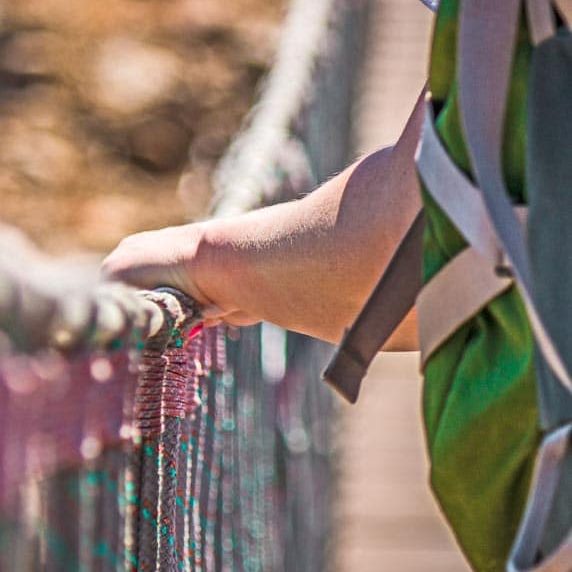
Healing Emotional Dependency in Teens & Families
Is your teen's emotional dependency getting in the way of their success and happiness?? Our wilderness therapy program offers unique and effective treatment for codependency that empowers teens to take charge of their own lives. Our program leverages the healing power of nature in combination with individual and family counseling to equip teens with the tools they need to overcome emotional dependency and achieve their goals.
Take our teen assessment and see if a wilderness therapy program is right for your family.
Are you tired of seeing your teen struggle with emotional dependency, unable to break free from the chains that are holding them back? If so, it's time to take action and get your teen emotional dependence treatment today!
Our wilderness program is specifically designed to help teens overcome emotional dependency and achieve their full potential. Our team of experts combines the latest evidence-based therapies with the healing power of nature to create a unique experience that is both transformational and empowering. From outdoor adventures to individual and family counseling, we provide the support and guidance that your teen needs to take control of their life and build a brighter future.
In this article, we'll explore what emotional dependency is, the different types of dependency, how to recognize the signs, and what the effects of leaving it untreated can be. We'll also provide some helpful tips on how parents can support their teen and why wilderness therapy is an excellent choice for families looking to break free from the chains of emotional dependency and build a brighter future. So, let's get started!
What is Emotional Dependency in Teens?
Emotional dependency is when a teenager relies too heavily on external people, places, things, or situations outside of themselves to fulfill their emotional needs. It usually happens when a teen doesn't know how to properly love and care for themselves. While it's common to depend on others when we are young and lack experience, the end goal is always to become more independent and self-sufficient.
Achieving emotional independence takes time, patience, and skills developed through mindfulness and learning from our experiences. Unfortunately, many teens still struggle with emotional dependency due to an inability to properly care for themselves, which leads to a reliance on external sources for support, approval, and guidance. This can be particularly dangerous when the focus of that dependency is a romantic partner. It's vital for teens to develop healthy self-care practices and work towards emotional independence to avoid negative outcomes.
Types of Emotional Dependency in Teens
As a parent, it's important to recognize the different types of emotional dependency that your teenager may be experiencing in order to provide them with the support and guidance they need to develop healthy relationship habits and foster their independence. Here are some of the types of emotional dependence in teens:
- Dependency on Parents: This is a common form of emotional dependence in teens, where they rely heavily on their parents for emotional support, validation, and guidance. They may struggle with decision-making and feel lost without their parents' input.
- Dependency on Peers: Teens may also become emotionally dependent on their peers, seeking validation and approval from their social group. They may go to great lengths to fit in and avoid rejection, even if it means compromising their values or interests.
- Dependency on Romantic Partners: Teenagers may develop emotional dependence on a romantic partner, relying on them for emotional support and validation. They may struggle with self-worth and identity outside of the relationship.
- Dependency on Achievement: Teenagers may become emotionally dependent on achievement, basing their self-worth on their grades or extracurricular activities like sports or performing arts. They may feel anxious or depressed when they don't meet their own or others' expectations.
- Dependency on Approval: Some teens may become emotionally dependent on the approval and validation of others, seeking constant reassurance and acceptance from their peers or authority figures.
- Dependency on Control: Some teens may become emotionally dependent on being in control, using it as a way to manage anxiety and stress.
- Dependency on Anticipation: Some teens may become emotionally dependent on the anticipation of future events, using them as a way to distract themselves from present difficulties or to boost their mood. This type of emotional dependence can manifest as an obsession with food, buying things, attending events, or making plans for the future. However, once the anticipated event is over, they feel a sense of emptiness and may struggle to find another source of excitement or distraction.
- Dependency on Technology: Some teens can develop emotional dependence on various technology outlets. They may feel like they need the validation and attention they receive on various platforms to feel good about themselves, and may struggle to disconnect from technology or manage their use in a healthy way. Dependency on technology may include:
- Social Media Dependence: With the prevalence of social media in teens' lives, they may become emotionally dependent on the attention and validation they receive online. They may feel anxious or disconnected when they don't receive likes or comments on their posts.
- Gaming Dependence: For some teens, video games can become a form of emotional dependence, providing an escape from reality and a sense of accomplishment. They may become obsessed with gaming to the point of neglecting other responsibilities or relationships.
- Dependency on Avoidance: Some teens may avoid facing their emotions, becoming emotionally dependent on distractions or numbing techniques such as binge-watching TV or overeating. They may struggle with regulating their emotions or understanding their own feelings.
- Dependency on Negative Attachment: In some cases, teens may become emotionally dependent on negative or harmful relationships, such as with an abusive partner or a toxic friend. They may struggle with leaving the relationship, even if it is causing them emotional harm.
- Dependency on Others' Problems: Some teens may become emotionally dependent on others' problems, using them as a way to avoid dealing with their own issues and as a way to feel needed and important.
What Causes Emotional Dependency in Teens?
Many factors can contribute to emotional dependency in teens, and while there is no single cause, emotional dependence often stems from a negative self-image. When your teen holds a negative view of themself, they rely on external sources like people or objects to provide them with a sense of worthiness or security.
Here are some factors that may contribute to a negative self-image and emotional dependency in teens:
- Developmental stage: Adolescence is a time of significant change and growth, and many teens experience emotional ups and downs as they navigate these changes. This can sometimes lead to emotional dependency as teens seek out support and validation from peers or romantic partners.
- Lack of emotional validation or support: When parents or caregivers struggle to provide emotional validation or support, teens may turn to peers or romantic partners to fulfill these needs, leading to emotional dependency.
- Traumatic experiences: Experiencing trauma such as abuse or neglect can have a profound impact on a teen's sense of self-worth and ability to form healthy relationships, potentially leading to emotional dependency.
- Mental health conditions: Teens who struggle with anxiety, depression, or other mental health conditions may seek out emotional validation or support as a coping mechanism, leading to emotional dependency.
- Lack of healthy boundaries: Teens who are not taught healthy boundaries in relationships may struggle to develop a strong sense of self and may rely on others for emotional validation or support.
- Temperament or personality traits: Some teens may be more prone to emotional dependency due to their temperament or personality traits, such as being highly sensitive or empathic.
At the bottom of everyone's dependency, there is always pain. Discovering the pain and healing it is an essential step in ending dependency
Signs of Emotional Dependency in Teens
Emotional dependency in teens can manifest in various ways. Some common signs to watch out for include:
- Constant need for approval: Teens who are emotionally dependent often seek constant reassurance and validation from their friends or romantic partners.
- Fear of rejection: They may have an intense fear of being rejected or abandoned by their peers, which can lead to anxious or clingy behavior.
- Difficulty making decisions: Emotionally dependent teens may struggle to make decisions independently and often rely on others to make choices for them.
- Loss of interest in hobbies and activities: They may lose interest in hobbies or activities they previously enjoyed, and instead prioritize spending time with their friends or significant others.
- Jealousy and possessiveness: Teens who are emotionally dependent may become jealous and possessive of their friends or romantic partners, leading to conflicts in their relationships.
- Mood swings: They may experience sudden mood swings, often feeling anxious, sad, or angry when they are not in the presence of their friends or significant others.
- Low self-esteem: While seeking validation and approval is a common symptom of emotional dependency, teens may also display a low sense of self-worth or self-esteem, feeling insecure or not good enough.
- Self-sabotage: Emotional dependency can lead teens to self-sabotage their relationships or other aspects of their life, such as school or work, due to a fear of losing their source of validation and security.
- Anxiety and depression: Teens who are emotionally dependent may experience symptoms of anxiety or depression when they are not with their friends or significant others, or when they feel their relationships are threatened.
- Inability to be alone: Teens who are emotionally dependent may struggle to be alone, feeling uncomfortable or anxious when they are not in the presence of others who provide them with validation and security.
- Perfectionism: Emotional dependency can also lead to perfectionism, where the teen may have high standards for themselves and others, and may become overly critical or demanding when those standards are not met.
- Fear of vulnerability: Individuals who are emotionally dependent may have a fear of vulnerability, feeling like they need to control everything in order to avoid being hurt or rejected.
- Obsessive need for control: Individuals who are emotionally dependent may feel an obsessive need to control everything around them, including situations, people, and even their own emotions and thoughts.
- Compulsive use of technology: Individuals who are emotionally dependent on technology may feel a compulsive need to use it, spending excessive amounts of time on their phones, browsing the internet, or engaging in social media.
- Distorted self-image: Due to social media, emotional dependency can lead to a distorted self-image, as teens may compare themselves to others online or seek validation through likes, followers, or comments.
- Inability to cope with uncertainty: Emotional dependency can lead to an inability to cope with uncertainty, where the teenager may feel anxious or overwhelmed when they don't know what's coming next.
- Constant need for stimulation: Emotional dependency can lead to a constant need for stimulation, where the teen may seek out new experiences, activities, or people to maintain their sense of excitement and anticipation.
- Excessive focus on future events: Teens who are emotionally dependent may focus excessively on future events or plans, feeling anxious or restless if they don't have anything to look forward to.
- Avoiding uncomfortable feelings: Individuals who are emotionally dependent may try to avoid uncomfortable or negative feelings, such as sadness, anger, or anxiety, by engaging in activities that distract or numb them, such as overeating or oversleeping.
- Denial or minimization of problems: They may deny or minimize problems or conflicts, and may avoid addressing issues that are causing them distress, hoping that they will go away on their own.
- Lack of assertiveness: Emotionally dependent teens may struggle with being assertive and setting boundaries with others, preferring to avoid conflicts or saying no to requests in order to maintain a sense of control or avoid uncomfortable feelings.
It's important to note that some of these behaviors can also be normal adolescent behavior, but when they become excessive and interfere with a teen's daily life, it may be a sign of emotional dependency that needs to be addressed.
You Are Not Alone
RedCliff Ascent is there for you and your family.
Importance of Early Intervention & Treatment for Emotional Dependency in Teens
Early intervention is crucial in addressing emotional dependency issues in teens for several reasons:
- Addressing emotional dependency early on can prevent it from becoming a chronic problem and escalating into more severe and potentially harmful behavior.
- Teens are still developing and their brains are more malleable, making it easier for them to learn new coping mechanisms and behaviors. It is harder for adults with more established patterns to learn the new skills necessary for emotional independence.
- Addressing dependence early on can help build a foundation of healthy coping skills and emotional regulation that can serve them well throughout their lives.
- Early intervention can also help prevent the development of comorbid conditions, such as depression and anxiety, that can arise as a result of emotional dependency.
- By addressing emotional dependence early on, parents can help their teens learn to manage their emotions in a healthy way, build positive relationships, and set the stage for a successful future.

Effects of Untreated Emotional Dependency on Teens
When left untreated, emotional dependency can have a wide range of effects on a teen's overall health and well-being, including:
Emotional Health
- Co-occurring conditions: Emotional dependency can lead to feelings of anxiety, depression, and low self-worth.
- Short-term instability: Teens may struggle to regulate their emotions and have intense mood swings.
- Low Resilience: Teens who don't acquire the essential emotional skills may face challenges in coping with stress and adversity later in life due to emotional dependency
Physical Health
- Psychosomatic symptoms: Emotional dependency can also have physical effects on the body, including chronic stress, headaches, stomach aches, or muscle tension.
- Poor regulation of physical energy levels: Teens who depend on external sources to manage their emotions often experience issues with fatigue, low energy, and reduced physical activity levels.
- Effects of risky behaviors: Emotional dependence can drive some teens to engage in risky behaviors as a coping mechanism, including self-harm and risky sexual activities. These actions can result in long-lasting physical effects that take years to heal.
Social Health
- Difficulty building and maintaining healthy relationships: Teens who are emotionally dependent may struggle with forming and maintaining healthy relationships with peers, romantic partners, and family members.
- Social isolation: Emotional dependency can cause teens to avoid or withdraw from social activities that spark intense emotions, which can exacerbate feelings of loneliness and depression.
- Need for constant validation: An emotionally dependent teen's need for constant validation and reassurance from others can put a strain on relationships.
Financial & Occupational Health
-
Difficulty with decision-making: Teens who are emotionally dependent may struggle with making decisions, which can affect their ability to choose a career path and plan for their financial future.
-
Low motivation: Emotional dependency can lead to low motivation and lack of drive, which can impact a teen's ability to work and achieve financial independence.
-
Poor financial management: Teens who struggle with emotional dependency may make impulsive or reckless decisions with money. They may be more likely to make impulsive purchases or to spend money to try to regulate their emotions, leading to uncertainty about their own ability to support themselves in the future.
Intellectual Health
-
Poor academic performance: Emotionally dependent teens may struggle to focus on their studies or have difficulty completing assignments on time due to their emotional distress.
-
Limited perspective: Teens who are emotionally dependent may have a limited perspective on the world around them and struggle to see different points of view, hindering their intellectual growth.
-
Impaired problem-solving skills: Teens who are emotionally dependent may also struggle with problem-solving, as their emotional distress can interfere with their ability to approach problems in a logical and systematic way.
Spiritual Health
- Impaired identity development: Teens who struggle with emotional dependency may struggle to develop a strong sense of identity and may have a limited sense of self-worth.
- Difficulty with autonomy: These teens may have difficulty finding and pursuing their passions and goals, as they may prioritize seeking external validation and approval over their own desires and interests. This can make it difficult for teens to develop a sense of autonomy and independence.
- Lack of meaning & purpose: Unresolved emotional dependency in teens can also affect a teen's sense of meaning and purpose in life which can impact their ability to take ownership of their lives and pursue their goals with confidence and purpose.
It's important for parents and caregivers to recognize the signs of emotional dependency in teens and to seek appropriate support and resources as quickly as possible to help them overcome these challenges.
Early Intervention Is Important For Overcoming Teen Emotional Dependence
Early intervention refers to recognizing the warning signs of emotional dependence in teens and acting before it gets worse. When you realize that your teen is struggling with emotional dependency it’s important to get professional treatment before it becomes worse.
Early intervention and treatment for teens struggling with emotional dependency can have several benefits for parents and families, including:
- Improved family relationships: When teens receive help for emotional dependency, they can begin to develop healthier ways of relating to others, which can improve family dynamics and relationships.
- Reduced stress: Emotional dependency can create significant stress and strain on parents and families. Early intervention and treatment can help reduce this stress and improve overall well-being.
- Increased independence: As teens develop emotional independence and learn to regulate their own emotions, they can become more independent and self-reliant, which can lead to greater success in other areas of life.
- Better academic performance: Emotional dependency can negatively impact academic performance, but early intervention and treatment can help teens develop better coping strategies and improve their academic performance.
- Greater sense of purpose and direction: With the help of therapy and other interventions, teens struggling with emotional dependency can develop a greater sense of purpose and direction in life, which can lead to a more fulfilling and satisfying future.
Overall, early intervention and treatment can help teens struggling with emotional dependency build the skills and resources they need to thrive, while also benefiting their families and loved ones.
Emotional Dependence Treatment Options for Teens
As a parent, it's important to know the different treatment options available to help your teen heal from emotional dependency. Some of the options include:
- Outpatient therapy: This is a form of therapy where your teen attends regular therapy sessions with a licensed therapist or counselor. The goal is to help your teen develop emotional skills, such as healthy communication, problem-solving, and coping strategies.
- Intensive outpatient therapy: This is a more intensive form of therapy that requires the teen to attend therapy sessions several times a week. It is recommended for teens who need more intensive support than what traditional outpatient therapy can offer, but who do not require residential treatment.
- Community-based programs: Community-based programs offer support and guidance to teens in a non-clinical environment. They may involve emotional regulation classes, group therapy sessions, recreational activities, and skill-building workshops.
- Residential treatment: Residential treatment programs offer a more intensive level of care for teens who need round-the-clock support and structure. These programs can provide a safe and secure environment for your teen to become emotionally independent and work through other behavioral issues.
- Wilderness therapy: Wilderness therapy programs use the great outdoors to help teens heal from emotional dependency and other emotional issues. These programs involve outdoor activities, group therapy sessions, and individual counseling to help teens develop new coping skills to develop self-reliance and emotional resilience.
Ultimately, the best option for your teen will depend on their individual needs and the severity of their emotional dependency issues. It's important to work with a mental health professional to determine the best course of action.
What is Wilderness Therapy?
Wilderness therapy is a type of emotional dependency treatment for teens that uses nature, wilderness activities, and therapy as a means to address and heal teen emotional dependence. Wilderness therapy takes full advantage of the outdoors and its ability to foster change. The outdoors provide teens with a contrasting environment to observe aspects of themselves that are often overlooked in traditional talk therapy.
As the leader in wilderness therapy, RedCliff Ascent is an effective treatment program for struggling teens aged 13-17. RedCliff Ascent’s safe, nurturing, and supportive environment provides teens with the skills they need to cope in a healthy and age-appropriate way.

Benefits of Wilderness Therapy for Emotionally Dependent Teens
Being immersed in nature can have a profound impact on a teenager. It improves their mental, emotional and physical health. When combined with a trusted clinical approach, a therapeutic wilderness experience helps emotionally dependent teens develop self-reliance and emotional resilience.
Here are five specific benefits your family can expect to see while your teen is in wilderness therapy.
Emotional dependency is often a sign of underlying mental health issues, rather than the root cause. Research suggests that accurate mental health assessments can reduce the time needed for treatment by up to 20%, resulting in more effective outcomes for teens struggling with emotional dependency.
By exposing your teen to new and challenging experiences in nature, wilderness therapy can help your teen to break free from the negative behaviors associated with emotional dependency.
Adolescents who are deeply entrenched in emotional dependency may find it difficult to stick with traditional forms of therapy and are more likely to discontinue treatment prematurely.
This lack of engagement can have negative effects on treatment outcomes, such as symptom relapse. However, we've found that teens who have been resistant to therapy in the past often become more involved and invested in the treatment process at our wilderness therapy program.
Our program at RedCliff Ascent is designed to help emotionally dependent teens learn and grow in a safe and supportive environment, where they can build the social and emotional learning skills they need to lead healthy and fulfilling lives.
If you're like most parents, you don't want to just get rid of your teen's emotional dependency issues. You want them to eventually become thriving, independent adults equipped with the skills necessary to succeed outside your home. These include:
Resilience - the ability to successfully adapt to challenging situations despite risk and adversity. Resilience helps us develop social competence, problem-solving skills, critical consciousness, autonomy, and a sense of purpose.
Leadership & Social Competence skills include qualities such as:
- responsiveness, especially the ability to elicit positive responses from others
- flexibility
- empathy
- communication skills
- and a sense of humor
Problem-solving skills - the ability to plan; to be resourceful in seeking help from others; and to think critically, creatively, and reflectively.
Autonomy is having a sense of one’s own identity and an ability to act independently and to exert some control over one’s environment, including a sense of task mastery, internal locus of control, and self-efficacy. The development of resistance (refusing to accept negative messages about oneself) and of detachment (distancing oneself from dysfunction) serves as a powerful protector of autonomy.
Sense of Purpose and a belief in a bright future, including goal direction, educational aspirations, achievement motivation, persistence, hopefulness, optimism, and spiritual connectedness.
98% of students report feeling connected to RedCliff's staff and one or more of their peers.
Upon completion of the program, 86% of parents reported improvement in their child's problems when compared to when they entered
12 months after treatment 86% of parents reported that their child's problems are improved since they completed treatment
How Does Wilderness Therapy Work?
RedCliff Ascent has helped emotionally dependent teenagers for almost 30 years and has conducted research since its inception. Through our research, we have identified seven principles that actually make a difference in helping your whole family recover from your teen's emotional dependency.

Healthy relationships are not only the foundation for growth and development but the launchpad for a successful future as well.
Your teen will live in a small group where social influence and feedback can be given and received in a safe and supportive way. This safe environment teaches your teen to build healthy relationships with both their peers and mentors. Having the skills to make and keep healthy relationships is essential to overcoming emotional dependency issues.
Treatment for emotional dependency in teens is most effective when it is responsive to your teen’s specific struggles, strengths, personality, sociocultural context, and preferences. Our evidence-based treatment approach combines decades of research and clinical expertise to personalize a treatment plan that fits your teen’s unique struggles, characteristics, culture, and preferences.
One common theme in feedback from RedCliff Ascent’s students is that the challenging and novel environment provided them with a new perspective on their life and everything they knew before wilderness therapy.
Novel physical environments are a place of contrast that confront the world views your teen takes for granted. This helps your teen to see with a fresh perspective and see new options available to them. Growth occurs outside of the comfort zone and is accelerated in environments that push physical and mental limits.
Your teen's emotional dependency didn't develop in isolation, it affects everyone in your family. The healing process should apply to your whole family as well. Parental involvement and family support during treatment greatly increase your teen’s progress in treatment and helps them to adapt after treatment.
Communicating through handwritten letters provides a novel and powerful way to work through your family's struggles. You will also have access to our parent resource library, a weekly support call with other parents like you, as well as a weekly session with your child's therapist.
Your teen's emotional dependency fills every aspect of their life. The best treatment programs must heal every part of their life as well. They use a holistic and integrated approach so that every aspect of your teen's life can heal from emotional dependence. In our treatment program, mentors, therapists, doctors, nurses, academic directors, nutritionists, and everyone on your teen's treatment team will meet together each week to discuss how to best help your child.
Teens with emotional dependency struggle to believe in themselves. By teaching basic primitive living skills, teens gain confidence in themselves that carries on to all aspects of their lives. By knowing that they are able to survive in nature, teens thrive at home, in school, and in their relationships.
At RedCliff Ascent, we understand the challenges of parenting a teenager who is struggling with emotional dependency issues. Our proven approach to wilderness therapy has helped hundreds of families find the path to healing and recovery. With our safe and nurturing environment, expert staff, and evidence-based therapies, we can help your teen develop the skills they need to manage their emotions and live a fulfilling life.
If you're ready to take the first step toward healing, we invite you to speak with one of our admissions consultants to learn more about how we can help your family. Contact us today and let us help you find hope and healing for your teenager.
Exclusionary criteria for RedCliff Ascent include:
- Teens younger than 13 and older than 17.5
- Teens with a physical limitation, i.e. wheelchair, crutches, etc.
- Teens with conditions that need intensive medical care or monitoring, i.e. eating disorders, diabetes, etc.
- Teens with a history of violence or sexual assault
- Teens with psychosis or schizophrenia
RedCliff Ascent does not take Medicare or Medicaid.
What Our Clients Say About RedCliff Ascent
I’d like to let you know how delighted I am with the RedCliff program and how impressive the hard work and dedication of the staff is...We feel that your program has very probably saved this child’s life and given us back our son.
- Kathy
We are very pleased with [our daughter's] self-improvements. A year ago we would not have dreamed all this to be possible! The path she head down was self-destruction. The impact of the RedCliff program is what turned [her] around. Our headstrong daughter was able to take stock of her past behavior, deal with her anger towards us, and begin to move in a more positive direction.
Even though sending her to RedCliff was a gut-wrenching decision, we know we did the right thing. We are thankful for the help and insight you gave to her and us.
- Clark and Irene
Since [our son] went to RedCliff we have all been transformed, but none as much as he. All of his teachers had nothing but good things to say about him. There have been no behavior issues at school this year. As a matter of fact, his teachers stated that they would like it if they had more students like Rob in their classes. I cried again at this meeting, but this time they were tears of joy.
- Julie


Backed by The Joint Commission which ensures programs adhere to the highest quality of clinical and medical practices.

Designated as a NATSAP Research Program, showing our commitment to well-researched practices in our program.

We are also OBH Accredited through the Association of Experiential Education (AEE) which regulates wilderness therapy practices.

Full member of the National Association of Therapeutic Schools and Programs (NATSAP), which ensure regulation of programs that serve children and adolescents.

RedCliff Ascent is fully licensed in the state of Utah.

Backed by the Association of Experiential Education (AEE) that ensures programs maintain appropriate professional behavior and risk management.

Founding member of the OBH Council (Outdoor Behavioral Healthcare Council).

Founding member of Choose Mental Health, guiding families with questions about mental health.
Every teen’s strengths and challenges are different. Complete the no-obligation teen assessment below to help us understand your family’s needs.
We respect your privacy and will never share your information.
We’re here to help - take the first step and contact us to see if wilderness therapy could be the path to healing for your family.
